In the Western tradition, philosophy represents a radical effort to understand reality. Philosophy casts an astonished, questioning gaze on the world around it and on mankind. The philosopher rejects the easy "obvious" and asks why things are the way they are. Rather than a discipline juxtaposed with others, philosophy as a critical approach thus constitutes an attitude and a spirit that apply to all registers, particularly intellectual, of human activity.
"What then is philosophy today (...) if it is not the critical work of thought on itself? And if it does not consist, instead of legitimizing what we already know, in undertaking to know how and to what extent it would be possible to think otherwise?" (Michel Foucault)
Spotlight
News

University and democracy: a living, sometimes threatened, link
University and democracy: a living, sometimes threatened, link
Trust of traditional political institutions and elected representatives, rise of authoritarian logics, definition of public services... Democracy today seems to be going through a turbulent zone. What role does the university play in this context? To shed light on this question, we interviewed four researchers from different disciplines: educationalist Sephora Boucenna, philosopher Louis Carré, political scientist Vincent Jacquet and legal scholar Aline Nardi. Their contrasting views sketch out the contours of an issue that is more topical than ever: thinking about and defending the link between university and democracy.

Democracy is by no means a fixed concept. It is the subject of debate, especially today. Louis Carré, Director of the Department of Philosophy and member of the Espace philosophique de Namur (Institut ESPHIN), proposes a three-dimensional definition: a political regime, a state of law and a way of forming society.
.The concept of democracy: between people power and centralization
"Etymologically, democracy is a political regime that consists in giving power to the people," he reminds us. "Our Western democracies today are based on the idea that the people are sovereign, without governing directly. From this arises a tension between ideal democracy and real democracy."Vincent Jacquet, professor in the Department of Social, Political and Communication Sciences and president of the Transitions Institute supports the point: "Democracy is an ideal of citizen self-government, but it is in tension with more centralizing, authoritarian logics. [...] Our political systems are crisscrossed by these different tensions, with both authoritarian logics increasingly present, including in our own country, and logics of participation that are sometimes accompanied by a great deal of hope and disappointment too."
The second pillar according to Louis Carré: the rule of law. Democracy guarantees the fundamental rights of all citizens through the constitution. But here again, beware of paradoxes: "One could indeed imagine laws passed by a majority of representatives or by a referendum, but which contravene fundamental rights" the philosopher stresses. Democracy cannot therefore be summed up by the majority principle alone.
Finally, democracy is also a way of forming society. It is based on real pluralism: diversity of opinions, beliefs and values. "This presupposes the existence of a relatively autonomous public space in the face of the power in place, which at times challenges the decisions taken by the governments that have been elected,"insists Louis Carré.
As such, citizens' distrust of politics is not necessarily a symptom of democratic crisis. It may even be a sign of its vitality, as Vincent Jacquet explains:"The fact that citizens are critical of their government is not necessarily negative because, in a democracy, citizens must be able to control the actions of those in power."

Training the governors... and the governed
In this context, what is the university's responsibility? Louis Carré begins by reminding us of a simple fact: a large proportion of our elected representatives have passed through university benches. But its teaching mission doesn't stop there. "It's about training enlightened citizens, not just rulers. Universities must offer quality higher education, open to as many people as possible", he asserts.
"Democracy does indeed presuppose citizens capable of debating, reflecting, problematizing issues", adds Sephora Boucenna, Dean of the Faculty of Education and Training Sciences and member of UNamur's Institut de Recherches en Didactiques et Éducation (IRDENA). It's all about training reflective minds, capable of questioning their times.
Training reflective teachers for critical citizens
Universities also train those who, tomorrow, will educate future generations: teachers. And here again, democracy is at stake.
"Our mission is to train reflective teachers who, in turn, will teach their students to think critically"insists Sephora Boucenna. This requires in-depth work on analyzing practices, collective construction and learning to debate, from initial teacher training through to in-service training.

Producing and disseminating knowledge... in complete independence
In addition to teaching, universities also have a research and social service mission. It produces knowledge that can enlighten public policy, but also question it. This critical function presupposes real independence from politics. "To analyze democratic mechanisms with lucidity, including those that governments put in place, the university must retain its freedom of research and speech," insists Vincent Jacquet.
Louis Carré goes further: "Like the press, the university is a form of counter-power in the public space". He also points out that "there is a confusion between freedom of opinion and academic freedom. Academic knowledge goes through a series of verification, experimentation and discussion procedures within the scientific community. This gives it a robustness that is not that of an opinion, a value, a belief."

This critical function of the university presupposes strong independence. In Belgium, however, university funding is largely a matter for the political authorities. "Celane must not mean being placed under tutelage", warns Louis Carré. "Conducting critical research that doesn't satisfy short-term sponsors requires independence, including in terms of resources. We need a large number of researchers who can analyze different types of dynamics. The more we cut research funding, as is the case today, the fewer researchers we'll have and therefore the less capacity for independent analysis and diversity of perspectives, insists Vincent Jacquet.
The "Université en colère" movement, recently launched within the universities of the Wallonia-Brussels Federation, intends to denounce the effects of definancement. Its representatives are calling for "guarantee the conditions for the development of an open, independent, quality university accessible to the greatest number. Faced with the social, economic and political challenges of our time, and because other choices for society, and therefore budgets, are possible, it is more essential than ever to strengthen the institutions and players at the heart of knowledge production."
Between vigilance and commitment: a link to be reinvented
Democracy is therefore not limited to elections or institutions. It is based on collective vigilance, carried by citizens, knowledge... and the places where this knowledge is built. In this respect, universities are an essential link in the chain of democratic vitality. Provided it remains independent, accessible and open to society.
"Democracy is not just a matter of institutions. It's about citizens who bring it to life and organize themselves to assert their perspectives at different times", insists Vincent Jacquet. A clear invitation not to remain a spectator, but to participate, with lucidity and exigency, in the construction of a common democratic future.
On the same subject
- Artificial intelligence, a danger for democracy?
An academic year focused on democracy
Find the speech given by Rectrice Annick Castiaux at the 2025-2026 Academic Back-to-School Ceremony.

Cet article est tiré de la rubrique "Le jour où" du magazine Omalius #38 (Septembre 2025).

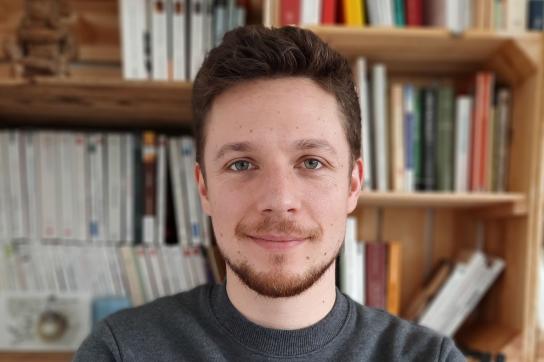
Jérôme Bouvy, Hospital philosopher
Jérôme Bouvy, Hospital philosopher
After studying philosophy at UNamur and a few years as a teacher, Jérôme Bouvy became the first hospital philosopher at the Grand Hôpital de Charleroi. His missions: to bring philosophy as a living practice to the heart of his institution's day-to-day operations, and to support workers in their quest for meaning in their work.
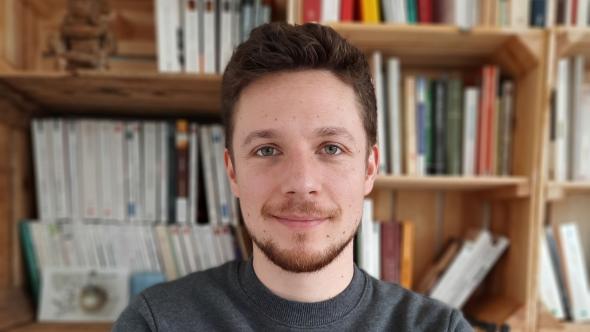
This article is taken from the "Alumni" section of the June 2024 issue of Omalius magazine.
Omalius: You're a hospital philosopher. Can you tell us more about this profession?
Jérôme Bouvy: Three years ago, the Grand Hôpital de Charleroi wanted to work on the loss of meaning in hospitals. Many questions have always agitated this environment, and this has been accentuated more recently following the pandemic, which in particular revealed a great deal of ethical suffering among caregivers. The role of a hospital philosopher, in the face of these many questions, is to open up spaces for reflection within the institution. My work therefore aims to deploy reflective practices, particularly in an environment where the search for meaning can be overwhelming, as is often the case in the healthcare field. My aim is to encourage hospital staff to take the time to think critically and share their concerns, in order to foster constructive dialogue. One of the special features of my role is that I don't speak directly to patients. I'm hired to work with staff members, whether they're nurses, IT specialists, accountants... that's over 200 professions.
O.How does this play out on a day-to-day basis?
J.B.: I run philosophy workshops or ethical times with hospital workers to liberate thought in the hospital and question what puts them in difficulty. These are places of comfort, where we re-weave the collective, but they are also sometimes places of discomfort. People don't just come to share their opinions, they come to question them. Workers also come to talk about their own vulnerability, as caregivers or citizens. To animate these spaces, I use tools from the new philosophical practices movement. I launch discussions with a philosophical and democratic purpose (developed by Michel Tozzi), and I make extensive use of the philosophical research community (developed by Matthew Lipman). In concrete terms, this can take the form of philosophy workshops, reading and writing groups, seminars or ethical marauding... In hospitals, the best entry point for caregivers is clinical ethics. Starting from a care situation, we can draw out the thread of questioning. We then arrive at philosophical questions or, more broadly, the humanities in healthcare. I defend the idea of a modest philosophy, with the aim of instilling a taste for philosophical practice. Philosophy isn't there to work miracles; it's there to question work. To do philosophy is already to show lucidity, to get away from simplisms that do us good.
O.What issues do you discuss at these meetings?
J.B.: There are many: hospital violence, autonomy, ethical suffering, compassion fatigue, vulnerability, or lack of dialogue. Relationships between doctors and nurses can also be difficult. The question is how to organize healthcare. There is sometimes talk of a managerial turnaround in this sector at the turn of the 80s, which put the organization of work in difficulty. This neo-management trend, which originated in the private sector, is also nibbling away at the hospital sector. This calls for a kind of vigilance. Being a philosopher in the hospital is not just about accompanying change. There's such an imperative today for adaptation and agility that we also need to be able to question the need for this change, and perhaps even sometimes resist it.
O.What skills does a hospital philosopher need?
J.B.: The main quality is undoubtedly humility. You don't come to the hospital saying "You're in pain, I'm here to help you", but rather with a "You're in pain, help me understand" approach. This humility is essential, because it's vital to recognize that the role of the hospital philosopher is not to provide preconceived answers, but rather to ask the right questions and encourage reflexivity. This also requires a strong capacity for listening and dialogue. Moreover, my role as president of the Cercle Carolo at UNamur during my studies and my festive side undoubtedly helped me to be at ease socially. For me, a philosopher has to know how to walk on two feet. Then there's the practical foot: being out in the field, working in teams. This implies a great deal of didactic attention (how do you arouse the interest of workers who don't feel concerned by philosophy?) The second foot is that of theory, via readings or conferences. There's always an imbalance between these two dimensions, because going out into the field means raising new questions, which call for a new theoretical exercise.
O.How do you see the future of philosophy in the hospital environment?
J.B.: There's a lot of curiosity about this new position. I'd love to see a network of hospital philosophers set up in the years to come - that would be great! Our ambition is to develop a culture of dialogue within the hospital, through deliberative forums that need to be institutionalized. Beyond the involvement of a philosopher, the aim is to make room for the humanities in healthcare. This can be achieved through the involvement of a sociologist, an anthropologist, a philosopher...
O.What advice would you give to young people who want to take up philosophy?
J.B.: I'd like to stress the importance of working seriously, without taking oneself too seriously. That's what guides me to this day. A philosopher who takes himself too seriously risks missing out on an essential form of lightness. You have to be able to find your balance and enjoy studying beyond the classroom, because partying is part of it too.
O.What do you remember about your time at the University of Namur?
J.B.: The word that comes to mind is "family". I haven't always been a very present student, but I've never felt abandoned by my teachers. They offer support that you can't find elsewhere. I might have dropped out at 18 if I hadn't benefited from this special support.
Course
This article is taken from the "Alumni" section of Omalius magazine #33 (June 2024).
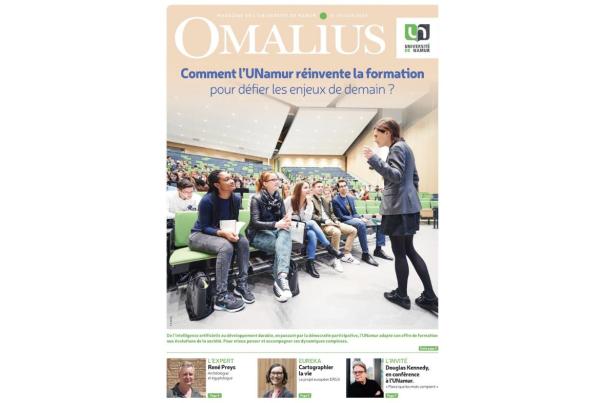
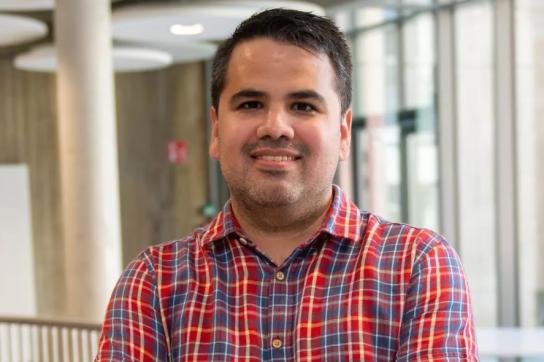
Portrait - Thibaut De Meyer: Multiplying perspectives across species
Portrait - Thibaut De Meyer: Multiplying perspectives across species
Discover the singular journey of Thibaut De Meyer, a passionate anthropologist and philosopher who fuses these two disciplines into a concrete and innovative approach. From his exploration of human interaction in the laboratory to his analysis of perspective in animals, his work reveals a fascination for the nuances of consciousness and perception. As an academic and author, he is committed to enlightening students on contemporary philosophical issues, while projecting his gaze to new horizons, such as the history and epistemology of the mirror test.
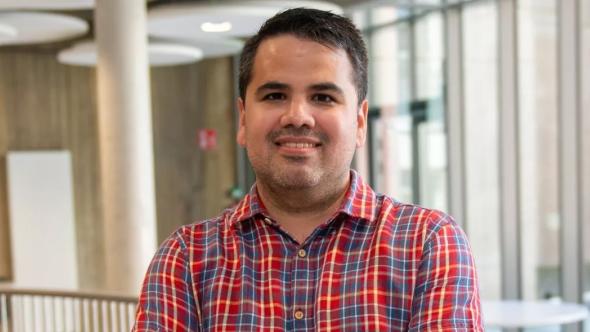
Thibaut De Meyer obtained his Master's degree in Anthropology at ULB, while nurturing a passion for philosophy. He therefore decided to also pursue a Master's degree in Philosophy, constantly seeking to establish balances and complementarities between these two fields. His approach has always been oriented towards concrete situations, where concepts are applied, in order to stay as close as possible to the realities studied by ethnologists and anthropologists. He has systematically explored the conceptual dimension in human actions and behaviors.
As part of his anthropology dissertation (People, Genes and Geneticists), he focused on the ethnography of a laboratory, examining how humans interact with blood bags and turn them into genetic maps of patients. In philosophy (in a dissertation entitled The Ecology of Monads), his interest focused on the concept of perspective in Leibniz, a modern thinker who explored the relationship between immaterial perspectives (which he called "monads") and material entities (bodies). Subsequently, Thibault De Meyer turned his attention to the question of consciousness in animals, notably by studying their ability to recognize themselves and attribute cognitive states to their fellow creatures.
Recently, Thibaut De Meyer has published a book entitled Qui a vu le zèbre? L'invention de la perspective animale (publisher: Les Liens qui Libèrent), in which he tackles the question of perspective through the case of zebra stripes, which are perceived differently by humans, lions, hyenas, flies... By taking into account this multiplicity of perspectives, biologists have come to question certain hypotheses seeking to explain the function of zebra stripes. Through a philosophical analysis of these scientific studies, Thibault De Meyer defends a form of relational perspectivism, which he distinguishes and compares to linear perspectivism, among others. This book stems from his doctoral thesis (Le bestiaire de Brunelleschi. Perspectivism and its reinvention in ethology) completed under the supervision of Vinciane Despret and defended in September 2022 at the University of Liège.
Since his academic appointment last September at UNamur, Thibaut De Meyer teaches philosophy of science and technology, as well as logic and argumentation. In the General Introduction to Philosophy course, together with his colleague Nicolas Monseu, he tries to make the subject attractive to students through pedagogical innovations, creating mini-shows, bringing in Lego blocks, etc.
As for his future projects, he plans to look into the history of the mirror test, the challenges it poses and the problems it solves, particularly as a non-verbal psychological test. As he points out, "The mirror is full of riddles."
Video TEDxTours | Acromatopsia: see colors differently | Thibault De Meyer
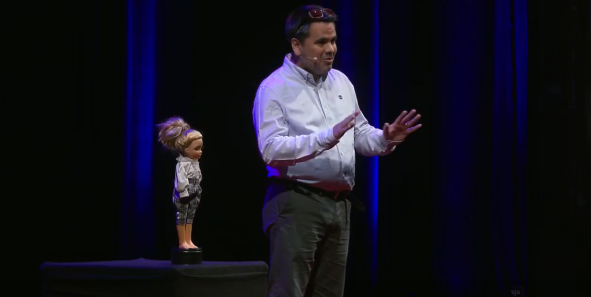

Arcadie, a new research centre in the ESPHIN institute
Arcadie, a new research centre in the ESPHIN institute
Arcadia is the name of an ideal society, a bucolic utopia. But it is also the name chosen by the members of a brand-new research centre at UNamur. This centre, created within the Faculty of Philosophy and Letters and attached to the ESPHIN institute, questions three themes at the heart of our contemporaneity: the Anthropocene, history and utopias.

Prolongeant les recherches menées dans le cadre du projet ARC « Philosophie critique de l’à-venir » (2015-2021), le nouveau centre, né en décembre 2021 à l’initiative de Sébastien Laoureux (professeur au Département de philosophie) et de Louis Carré (chercheur qualifié du FNRS), propose de traiter ces thématiques autour de la question : qu’est-ce que notre présent ? Comment caractériser l’époque que nous vivons ? Issu de la géologie, le terme d’Anthropocène s’est récemment imposé pour désigner l’époque au cours de laquelle les activités humaines et sociales se sont révélés avoir un impact majeur sur l’environnement. Il sert désormais de dénominateur commun pour penser les problèmes divers liés à la crise écologique globale que nous traversons.
L’idée originale du centre est de mobiliser la philosophie sur ces questions urgentes et d’articuler des champs de recherches le plus souvent séparés. Au quotidien, on ne cesse de constater que les activités humaines perturbent le climat. Pourtant, par-delà les alertes lancées, il paraît de plus en plus compliqué d’agir.
Le centre Arcadie propose une réflexion orientée vers l’action : que font les bouleversements climatiques et plus largement la crise écologique à notre expérience de la temporalité et à notre sens de l’histoire ? Comment pouvons-nous agir concrètement dans une telle situation ? Comment s’opposer à la démobilisation produite par l’horizon d’une catastrophe à la fois à venir et déjà largement en cours ? La référence aux utopies s’explique ainsi par un souci d’identifier des perspectives d’avenir et des alternatives au sein même d’un présent qui paraît saturé. L’utopie remplace l’impossible par le possible et permet d’inquiéter les logiques dominantes de notre temps.
Recherche
« Ce que l’Anthropocène fait au temps. Recherche philosophique sur les historicités et récits de la crise environnementale »
Sébastien Laoureux (promoteur) et Louis Carré se sont vu attribuer un projet de recherche PDR (FNRS) afin d’explorer ces questions. Le projet vise à interroger la crise écologique à partir de la nouvelle expérience du temps qu’elle produit et des transformations qu’elle provoque dans notre conception philosophique de l’histoire. L’Anthropocène vient en effet bouleverser la philosophie de l’histoire qui fondait la modernité : celle d’un temps orienté vers l’avenir et structuré par un progrès nécessaire de l’humanité. Contre cette vision linéaire du temps historique, la possibilité d’un « monde sans nous » ouverte par l’Anthropocène introduit une rupture dans la course au progrès dont il s’agit de tirer toutes les conséquences sur les plans théorique et pratique.
Les deux chercheurs ont été rejoints par trois doctorants : Laëtitia Riss, Vivien Giet et Salomé Frémineur et trois post-doctorants : Frédéric Monferrand, Jean-Baptiste Vuillerod et Amaury Delvaux.
Enseignement
Master interuniversitaire de spécialisation en philosophie et théorie politiques
Ce master, coorganisé par l’UNamur, l’ULB et l’ULiège, en est à sa troisième année d'existence. Il a participé à la dynamique qui débouche aujourd'hui sur la création du centre. Dans le cadre de ce Master, Louis Carré et Sébastien Laoureux organisent notamment un séminaire de philosophe sociale et politique consacré aux liens entre philosophie politique et écologie. Le thème du séminaire porte cette année sur les « limites de l’écologie ».

University and democracy: a living, sometimes threatened, link
University and democracy: a living, sometimes threatened, link
Trust of traditional political institutions and elected representatives, rise of authoritarian logics, definition of public services... Democracy today seems to be going through a turbulent zone. What role does the university play in this context? To shed light on this question, we interviewed four researchers from different disciplines: educationalist Sephora Boucenna, philosopher Louis Carré, political scientist Vincent Jacquet and legal scholar Aline Nardi. Their contrasting views sketch out the contours of an issue that is more topical than ever: thinking about and defending the link between university and democracy.

Democracy is by no means a fixed concept. It is the subject of debate, especially today. Louis Carré, Director of the Department of Philosophy and member of the Espace philosophique de Namur (Institut ESPHIN), proposes a three-dimensional definition: a political regime, a state of law and a way of forming society.
.The concept of democracy: between people power and centralization
"Etymologically, democracy is a political regime that consists in giving power to the people," he reminds us. "Our Western democracies today are based on the idea that the people are sovereign, without governing directly. From this arises a tension between ideal democracy and real democracy."Vincent Jacquet, professor in the Department of Social, Political and Communication Sciences and president of the Transitions Institute supports the point: "Democracy is an ideal of citizen self-government, but it is in tension with more centralizing, authoritarian logics. [...] Our political systems are crisscrossed by these different tensions, with both authoritarian logics increasingly present, including in our own country, and logics of participation that are sometimes accompanied by a great deal of hope and disappointment too."
The second pillar according to Louis Carré: the rule of law. Democracy guarantees the fundamental rights of all citizens through the constitution. But here again, beware of paradoxes: "One could indeed imagine laws passed by a majority of representatives or by a referendum, but which contravene fundamental rights" the philosopher stresses. Democracy cannot therefore be summed up by the majority principle alone.
Finally, democracy is also a way of forming society. It is based on real pluralism: diversity of opinions, beliefs and values. "This presupposes the existence of a relatively autonomous public space in the face of the power in place, which at times challenges the decisions taken by the governments that have been elected,"insists Louis Carré.
As such, citizens' distrust of politics is not necessarily a symptom of democratic crisis. It may even be a sign of its vitality, as Vincent Jacquet explains:"The fact that citizens are critical of their government is not necessarily negative because, in a democracy, citizens must be able to control the actions of those in power."

Training the governors... and the governed
In this context, what is the university's responsibility? Louis Carré begins by reminding us of a simple fact: a large proportion of our elected representatives have passed through university benches. But its teaching mission doesn't stop there. "It's about training enlightened citizens, not just rulers. Universities must offer quality higher education, open to as many people as possible", he asserts.
"Democracy does indeed presuppose citizens capable of debating, reflecting, problematizing issues", adds Sephora Boucenna, Dean of the Faculty of Education and Training Sciences and member of UNamur's Institut de Recherches en Didactiques et Éducation (IRDENA). It's all about training reflective minds, capable of questioning their times.
Training reflective teachers for critical citizens
Universities also train those who, tomorrow, will educate future generations: teachers. And here again, democracy is at stake.
"Our mission is to train reflective teachers who, in turn, will teach their students to think critically"insists Sephora Boucenna. This requires in-depth work on analyzing practices, collective construction and learning to debate, from initial teacher training through to in-service training.

Producing and disseminating knowledge... in complete independence
In addition to teaching, universities also have a research and social service mission. It produces knowledge that can enlighten public policy, but also question it. This critical function presupposes real independence from politics. "To analyze democratic mechanisms with lucidity, including those that governments put in place, the university must retain its freedom of research and speech," insists Vincent Jacquet.
Louis Carré goes further: "Like the press, the university is a form of counter-power in the public space". He also points out that "there is a confusion between freedom of opinion and academic freedom. Academic knowledge goes through a series of verification, experimentation and discussion procedures within the scientific community. This gives it a robustness that is not that of an opinion, a value, a belief."

This critical function of the university presupposes strong independence. In Belgium, however, university funding is largely a matter for the political authorities. "Celane must not mean being placed under tutelage", warns Louis Carré. "Conducting critical research that doesn't satisfy short-term sponsors requires independence, including in terms of resources. We need a large number of researchers who can analyze different types of dynamics. The more we cut research funding, as is the case today, the fewer researchers we'll have and therefore the less capacity for independent analysis and diversity of perspectives, insists Vincent Jacquet.
The "Université en colère" movement, recently launched within the universities of the Wallonia-Brussels Federation, intends to denounce the effects of definancement. Its representatives are calling for "guarantee the conditions for the development of an open, independent, quality university accessible to the greatest number. Faced with the social, economic and political challenges of our time, and because other choices for society, and therefore budgets, are possible, it is more essential than ever to strengthen the institutions and players at the heart of knowledge production."
Between vigilance and commitment: a link to be reinvented
Democracy is therefore not limited to elections or institutions. It is based on collective vigilance, carried by citizens, knowledge... and the places where this knowledge is built. In this respect, universities are an essential link in the chain of democratic vitality. Provided it remains independent, accessible and open to society.
"Democracy is not just a matter of institutions. It's about citizens who bring it to life and organize themselves to assert their perspectives at different times", insists Vincent Jacquet. A clear invitation not to remain a spectator, but to participate, with lucidity and exigency, in the construction of a common democratic future.
On the same subject
- Artificial intelligence, a danger for democracy?
An academic year focused on democracy
Find the speech given by Rectrice Annick Castiaux at the 2025-2026 Academic Back-to-School Ceremony.

Cet article est tiré de la rubrique "Le jour où" du magazine Omalius #38 (Septembre 2025).


Jérôme Bouvy, Hospital philosopher
Jérôme Bouvy, Hospital philosopher
After studying philosophy at UNamur and a few years as a teacher, Jérôme Bouvy became the first hospital philosopher at the Grand Hôpital de Charleroi. His missions: to bring philosophy as a living practice to the heart of his institution's day-to-day operations, and to support workers in their quest for meaning in their work.

This article is taken from the "Alumni" section of the June 2024 issue of Omalius magazine.
Omalius: You're a hospital philosopher. Can you tell us more about this profession?
Jérôme Bouvy: Three years ago, the Grand Hôpital de Charleroi wanted to work on the loss of meaning in hospitals. Many questions have always agitated this environment, and this has been accentuated more recently following the pandemic, which in particular revealed a great deal of ethical suffering among caregivers. The role of a hospital philosopher, in the face of these many questions, is to open up spaces for reflection within the institution. My work therefore aims to deploy reflective practices, particularly in an environment where the search for meaning can be overwhelming, as is often the case in the healthcare field. My aim is to encourage hospital staff to take the time to think critically and share their concerns, in order to foster constructive dialogue. One of the special features of my role is that I don't speak directly to patients. I'm hired to work with staff members, whether they're nurses, IT specialists, accountants... that's over 200 professions.
O.How does this play out on a day-to-day basis?
J.B.: I run philosophy workshops or ethical times with hospital workers to liberate thought in the hospital and question what puts them in difficulty. These are places of comfort, where we re-weave the collective, but they are also sometimes places of discomfort. People don't just come to share their opinions, they come to question them. Workers also come to talk about their own vulnerability, as caregivers or citizens. To animate these spaces, I use tools from the new philosophical practices movement. I launch discussions with a philosophical and democratic purpose (developed by Michel Tozzi), and I make extensive use of the philosophical research community (developed by Matthew Lipman). In concrete terms, this can take the form of philosophy workshops, reading and writing groups, seminars or ethical marauding... In hospitals, the best entry point for caregivers is clinical ethics. Starting from a care situation, we can draw out the thread of questioning. We then arrive at philosophical questions or, more broadly, the humanities in healthcare. I defend the idea of a modest philosophy, with the aim of instilling a taste for philosophical practice. Philosophy isn't there to work miracles; it's there to question work. To do philosophy is already to show lucidity, to get away from simplisms that do us good.
O.What issues do you discuss at these meetings?
J.B.: There are many: hospital violence, autonomy, ethical suffering, compassion fatigue, vulnerability, or lack of dialogue. Relationships between doctors and nurses can also be difficult. The question is how to organize healthcare. There is sometimes talk of a managerial turnaround in this sector at the turn of the 80s, which put the organization of work in difficulty. This neo-management trend, which originated in the private sector, is also nibbling away at the hospital sector. This calls for a kind of vigilance. Being a philosopher in the hospital is not just about accompanying change. There's such an imperative today for adaptation and agility that we also need to be able to question the need for this change, and perhaps even sometimes resist it.
O.What skills does a hospital philosopher need?
J.B.: The main quality is undoubtedly humility. You don't come to the hospital saying "You're in pain, I'm here to help you", but rather with a "You're in pain, help me understand" approach. This humility is essential, because it's vital to recognize that the role of the hospital philosopher is not to provide preconceived answers, but rather to ask the right questions and encourage reflexivity. This also requires a strong capacity for listening and dialogue. Moreover, my role as president of the Cercle Carolo at UNamur during my studies and my festive side undoubtedly helped me to be at ease socially. For me, a philosopher has to know how to walk on two feet. Then there's the practical foot: being out in the field, working in teams. This implies a great deal of didactic attention (how do you arouse the interest of workers who don't feel concerned by philosophy?) The second foot is that of theory, via readings or conferences. There's always an imbalance between these two dimensions, because going out into the field means raising new questions, which call for a new theoretical exercise.
O.How do you see the future of philosophy in the hospital environment?
J.B.: There's a lot of curiosity about this new position. I'd love to see a network of hospital philosophers set up in the years to come - that would be great! Our ambition is to develop a culture of dialogue within the hospital, through deliberative forums that need to be institutionalized. Beyond the involvement of a philosopher, the aim is to make room for the humanities in healthcare. This can be achieved through the involvement of a sociologist, an anthropologist, a philosopher...
O.What advice would you give to young people who want to take up philosophy?
J.B.: I'd like to stress the importance of working seriously, without taking oneself too seriously. That's what guides me to this day. A philosopher who takes himself too seriously risks missing out on an essential form of lightness. You have to be able to find your balance and enjoy studying beyond the classroom, because partying is part of it too.
O.What do you remember about your time at the University of Namur?
J.B.: The word that comes to mind is "family". I haven't always been a very present student, but I've never felt abandoned by my teachers. They offer support that you can't find elsewhere. I might have dropped out at 18 if I hadn't benefited from this special support.
Course
This article is taken from the "Alumni" section of Omalius magazine #33 (June 2024).


Portrait - Thibaut De Meyer: Multiplying perspectives across species
Portrait - Thibaut De Meyer: Multiplying perspectives across species
Discover the singular journey of Thibaut De Meyer, a passionate anthropologist and philosopher who fuses these two disciplines into a concrete and innovative approach. From his exploration of human interaction in the laboratory to his analysis of perspective in animals, his work reveals a fascination for the nuances of consciousness and perception. As an academic and author, he is committed to enlightening students on contemporary philosophical issues, while projecting his gaze to new horizons, such as the history and epistemology of the mirror test.

Thibaut De Meyer obtained his Master's degree in Anthropology at ULB, while nurturing a passion for philosophy. He therefore decided to also pursue a Master's degree in Philosophy, constantly seeking to establish balances and complementarities between these two fields. His approach has always been oriented towards concrete situations, where concepts are applied, in order to stay as close as possible to the realities studied by ethnologists and anthropologists. He has systematically explored the conceptual dimension in human actions and behaviors.
As part of his anthropology dissertation (People, Genes and Geneticists), he focused on the ethnography of a laboratory, examining how humans interact with blood bags and turn them into genetic maps of patients. In philosophy (in a dissertation entitled The Ecology of Monads), his interest focused on the concept of perspective in Leibniz, a modern thinker who explored the relationship between immaterial perspectives (which he called "monads") and material entities (bodies). Subsequently, Thibault De Meyer turned his attention to the question of consciousness in animals, notably by studying their ability to recognize themselves and attribute cognitive states to their fellow creatures.
Recently, Thibaut De Meyer has published a book entitled Qui a vu le zèbre? L'invention de la perspective animale (publisher: Les Liens qui Libèrent), in which he tackles the question of perspective through the case of zebra stripes, which are perceived differently by humans, lions, hyenas, flies... By taking into account this multiplicity of perspectives, biologists have come to question certain hypotheses seeking to explain the function of zebra stripes. Through a philosophical analysis of these scientific studies, Thibault De Meyer defends a form of relational perspectivism, which he distinguishes and compares to linear perspectivism, among others. This book stems from his doctoral thesis (Le bestiaire de Brunelleschi. Perspectivism and its reinvention in ethology) completed under the supervision of Vinciane Despret and defended in September 2022 at the University of Liège.
Since his academic appointment last September at UNamur, Thibaut De Meyer teaches philosophy of science and technology, as well as logic and argumentation. In the General Introduction to Philosophy course, together with his colleague Nicolas Monseu, he tries to make the subject attractive to students through pedagogical innovations, creating mini-shows, bringing in Lego blocks, etc.
As for his future projects, he plans to look into the history of the mirror test, the challenges it poses and the problems it solves, particularly as a non-verbal psychological test. As he points out, "The mirror is full of riddles."
Video TEDxTours | Acromatopsia: see colors differently | Thibault De Meyer


Arcadie, a new research centre in the ESPHIN institute
Arcadie, a new research centre in the ESPHIN institute
Arcadia is the name of an ideal society, a bucolic utopia. But it is also the name chosen by the members of a brand-new research centre at UNamur. This centre, created within the Faculty of Philosophy and Letters and attached to the ESPHIN institute, questions three themes at the heart of our contemporaneity: the Anthropocene, history and utopias.

Prolongeant les recherches menées dans le cadre du projet ARC « Philosophie critique de l’à-venir » (2015-2021), le nouveau centre, né en décembre 2021 à l’initiative de Sébastien Laoureux (professeur au Département de philosophie) et de Louis Carré (chercheur qualifié du FNRS), propose de traiter ces thématiques autour de la question : qu’est-ce que notre présent ? Comment caractériser l’époque que nous vivons ? Issu de la géologie, le terme d’Anthropocène s’est récemment imposé pour désigner l’époque au cours de laquelle les activités humaines et sociales se sont révélés avoir un impact majeur sur l’environnement. Il sert désormais de dénominateur commun pour penser les problèmes divers liés à la crise écologique globale que nous traversons.
L’idée originale du centre est de mobiliser la philosophie sur ces questions urgentes et d’articuler des champs de recherches le plus souvent séparés. Au quotidien, on ne cesse de constater que les activités humaines perturbent le climat. Pourtant, par-delà les alertes lancées, il paraît de plus en plus compliqué d’agir.
Le centre Arcadie propose une réflexion orientée vers l’action : que font les bouleversements climatiques et plus largement la crise écologique à notre expérience de la temporalité et à notre sens de l’histoire ? Comment pouvons-nous agir concrètement dans une telle situation ? Comment s’opposer à la démobilisation produite par l’horizon d’une catastrophe à la fois à venir et déjà largement en cours ? La référence aux utopies s’explique ainsi par un souci d’identifier des perspectives d’avenir et des alternatives au sein même d’un présent qui paraît saturé. L’utopie remplace l’impossible par le possible et permet d’inquiéter les logiques dominantes de notre temps.
Recherche
« Ce que l’Anthropocène fait au temps. Recherche philosophique sur les historicités et récits de la crise environnementale »
Sébastien Laoureux (promoteur) et Louis Carré se sont vu attribuer un projet de recherche PDR (FNRS) afin d’explorer ces questions. Le projet vise à interroger la crise écologique à partir de la nouvelle expérience du temps qu’elle produit et des transformations qu’elle provoque dans notre conception philosophique de l’histoire. L’Anthropocène vient en effet bouleverser la philosophie de l’histoire qui fondait la modernité : celle d’un temps orienté vers l’avenir et structuré par un progrès nécessaire de l’humanité. Contre cette vision linéaire du temps historique, la possibilité d’un « monde sans nous » ouverte par l’Anthropocène introduit une rupture dans la course au progrès dont il s’agit de tirer toutes les conséquences sur les plans théorique et pratique.
Les deux chercheurs ont été rejoints par trois doctorants : Laëtitia Riss, Vivien Giet et Salomé Frémineur et trois post-doctorants : Frédéric Monferrand, Jean-Baptiste Vuillerod et Amaury Delvaux.
Enseignement
Master interuniversitaire de spécialisation en philosophie et théorie politiques
Ce master, coorganisé par l’UNamur, l’ULB et l’ULiège, en est à sa troisième année d'existence. Il a participé à la dynamique qui débouche aujourd'hui sur la création du centre. Dans le cadre de ce Master, Louis Carré et Sébastien Laoureux organisent notamment un séminaire de philosophe sociale et politique consacré aux liens entre philosophie politique et écologie. Le thème du séminaire porte cette année sur les « limites de l’écologie ».




